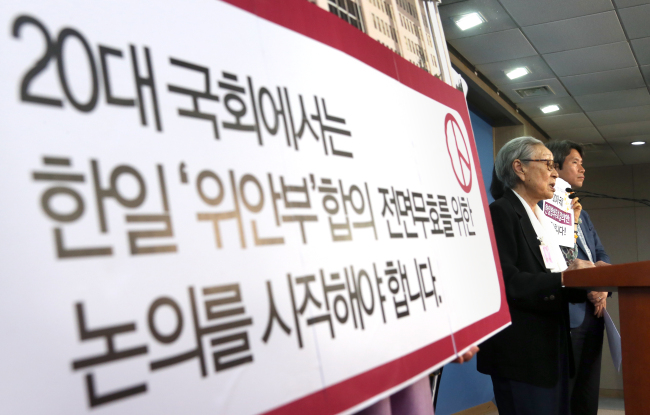Following a months-long tug of war, a public-private committee will be launched Tuesday in Seoul to lay the groundwork for a fund for the victims of Japan’s sex slavery during World War II, the Korean government said Monday.
The preparation committee will consist of nine private sector experts and an official each from the foreign and gender equality ministries tasked with drafting articles of association, setting up a secretariat and other administrative affairs for the envisioned organization.
The panel will likely be chaired by Kim Tae-hyeon, a professor emeritus in social welfare at Sungshin Women‘s University in Seoul, who has also been providing advice on the establishment of the foundation.
Kim had participated in President Park Geun-hye’s presidential campaign as a women’s studies specialist.
“With the inception of the committee, we will strive to complete necessary preparation as quickly as possible, preferably next month or in July, in line with our goal of introducing the foundation within the first half of this year,” a Foreign Ministry official told reporters on customary condition of anonymity.
The preparation committee will consist of nine private sector experts and an official each from the foreign and gender equality ministries tasked with drafting articles of association, setting up a secretariat and other administrative affairs for the envisioned organization.
The panel will likely be chaired by Kim Tae-hyeon, a professor emeritus in social welfare at Sungshin Women‘s University in Seoul, who has also been providing advice on the establishment of the foundation.
Kim had participated in President Park Geun-hye’s presidential campaign as a women’s studies specialist.
“With the inception of the committee, we will strive to complete necessary preparation as quickly as possible, preferably next month or in July, in line with our goal of introducing the foundation within the first half of this year,” a Foreign Ministry official told reporters on customary condition of anonymity.

The launch comes some five months after Seoul and Tokyo reached a settlement to end long-festering rows on “comfort women” issues.
Under the deal, Japanese Prime Minister Shinzo Abe offered an apology and pledged to provide 1 billion yen ($9 million) from state coffers to establish the foundation, conceding the government’s responsibility for its military’s wartime sexual enslavement of Korean women.
But the committee faces challenges ahead. Many surviving victims and their advocates stridently oppose the compromise, while overall public sentiment remains bitter, especially since Tokyo has called for the removal of a memorial that represents the victims opposite the Japanese Embassy in Seoul.
By Shin Hyon-hee (heeshin@heraldcorp.com)
Under the deal, Japanese Prime Minister Shinzo Abe offered an apology and pledged to provide 1 billion yen ($9 million) from state coffers to establish the foundation, conceding the government’s responsibility for its military’s wartime sexual enslavement of Korean women.
But the committee faces challenges ahead. Many surviving victims and their advocates stridently oppose the compromise, while overall public sentiment remains bitter, especially since Tokyo has called for the removal of a memorial that represents the victims opposite the Japanese Embassy in Seoul.
By Shin Hyon-hee (heeshin@heraldcorp.com)






![[Graphic News] Number of coffee franchises in S. Korea rises 13%](http://res.heraldm.com/phpwas/restmb_idxmake.php?idx=644&simg=/content/image/2024/05/02/20240502050817_0.gif&u=)


![[Robert J. Fouser] AI changes rationale for learning languages](http://res.heraldm.com/phpwas/restmb_idxmake.php?idx=644&simg=/content/image/2024/05/02/20240502050811_0.jpg&u=)







![[Eye Interview] 'If you live to 100, you might as well be happy,' says 88-year-old bestselling essayist](http://res.heraldm.com/phpwas/restmb_idxmake.php?idx=652&simg=/content/image/2024/05/03/20240503050674_0.jpg&u=)
